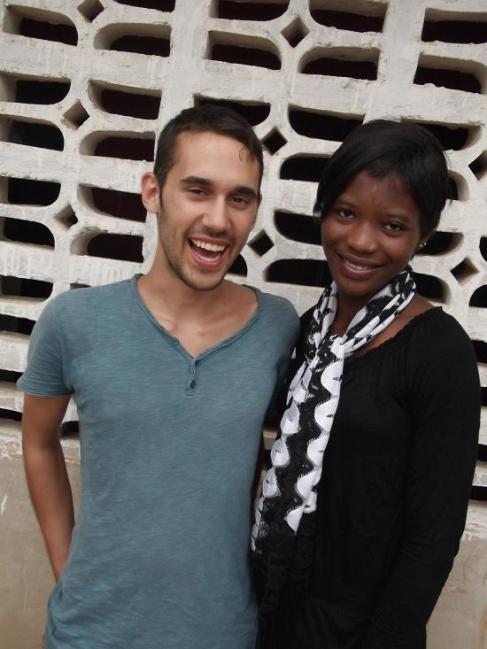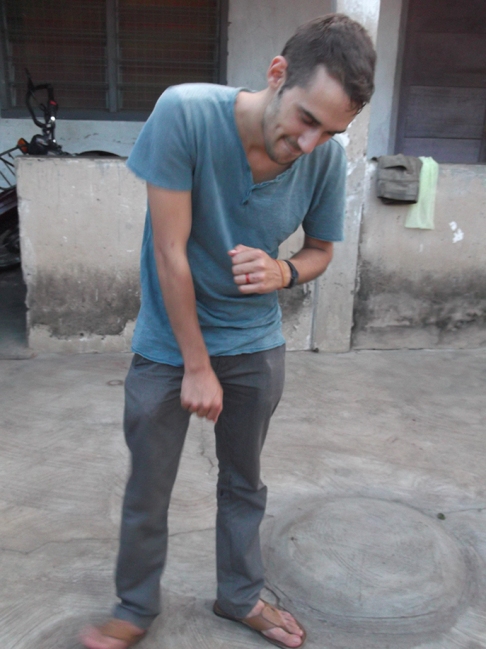Vision 2020 for Agriculture in Ghana Pt. 1
Vision 2020 for Agriculture in Ghana.
[15 days until prototype of course]
My friend Guillaume did recently this series of blogposts on his challenges in Ghana, This inspired me to do the same with Agriculture. And I’m kinda stealing the title from Ryan’s post.
Part 1: For a stronger role of the private sector in providing extensions services to farmer in Ghana.
– Okay, that’s a long title, but I couldn’t find shorter, and less serious. So let me explain:
Extension services refers to any kind of information about best-practices provided to farmers. Answers to questions like, How should farmers plant their maize? What is the ideal distance between cashew trees? Why is my plantain trees covered with white spots? People who provide those answers are called Agricultural Extensions Agents (AEAs). Like engineers make the bridge between science and humanity, AEAs extend the research institutes’ knowledge to farmers.
In the present system, AEAs work for the government, under the Ministry of Food and Agriculture. This leads to the following issues:
– AEAs are underfinanced. Less then 10% of government’s budget goes to agriculture. So they are asked to change the world, but given very limited ressources. Since couple of months, due to a inflation crisis, they have not received any money for their fuel, so they are basically volunteering right now.
– Not enough AEAs. Extension agents are usually responsible of 2000-3000 farmers. For a 40 hours week, that’s about a minute given per farmer.
– AEAs wear multiple hats at the same time. In Canada, they would have all the following titles: land surveyers, agroeconomists, agriculturalists, business advisors, teachers, etc. They are asked to be experts in every crops, animals and processing methods.
– They work by area. The underlying assumption is that all people in the same place require the same information services, which is untrue. They are asked to answer thousands of different questions every week, making the whole process of information transfer inefficient.
– Decisions are centralized. Let’s say an extension agent found a really good way to teach agribusiness to farmers. Even if the results were delivered, at the end of year, it’s the government who decides in which programs to put the money. And so any novelty born at the bottom is killed by the policies at the top. This is what happened to the Agriculture As Business program.
For these reasons, I call for a stronger private sector in extension services for 2020. In clear, that would mean that the private extension agents (PEAs) would be paid by the customers. What would it look like? Farmers could pay each time they receive a service, say 5 cedis to get your land measured and mapped. Or they could pay every year, say 1 cedi to get supports for Cashew trees.
– Logically, they would serve just the right amount of farmers. Less people would diminish their revenues, and more people would harm the quality of their service.
– PEAs would only wear one hat, say Fertilizer expert. Farmers would have their set of PEAs corresponding to their needs.
– They would work under competence, not area. Each PEA would therefore become real experts in their respective fields.
– Free-market principles would make the whole thing dynamic. PEAs would contantly have to adapt their methods, if they don’t want to be outcast by competition.
In my view, this would result in better services provided to farmers, therefore a stronger agricultural sector for Ghana. But there’s always the risk that the poorest of the poorest, who would need the information most, couldn’t aford the services. Or that some necessary areas of extension services would not be profitable for private companies, are therefore be left out.
So why isn’t it happening? My team leader Erin, got the answer. She presented the idea of paying for information to a rural farmer, and started at 1$/year, hoping to increase the price and see how much would a farmer pay. But immediatly, the guy replied no: why paying for something that they already can have for free?
What’s preventing a market from emerging is purely the farmer’s perception. First, we have to convince farmers that paying themselves would result in better quality services. But Extension Agents have already struggles convincing them that planting in rows is more efficient in the end. The idea is miles from them.
I’m lying.
There’s already one example of private extension agents: veterinarians. Even thought AEAs also wear that hat, most people are ready to pay for a rapid, efficient check-up. My hypothesis is that lifestock and poultry farmers have a better business mindset, and that therefore see the use.
Another great example coming is the project on which my friend Alex is working: Farmerline. The idea is that farmers far from urban centers could send sms or leave a message, and an extension agent equipped with a database would reply back. They are still in the design process.
So where does my placement fit in all this? No where, since I’m working under a public Farm Institute. It’s a little streched, but we’re intending on making people pay for the course I’m designing. It’s a simple of testing the idea. Would people be ready to pay 15 cedis, So less then 9$, for a 15 hour Agribusiness Training program? The answer next week.
Meanwhile, you can tell me what you think on all this.
Julien


The idea of having AEAs become experts in their field is interesting. How do you think this would work for traveling? I imagine you would have to travel over a larger area than you currently are if you wanted to provide only a specific type of extension. Do you think farmers would be able to tell which AEA was offering better extension on a particular topic, eg maize cultivation? I suppose reputation would spread, but it would be interesting to see.
The thing is that there is so many models on how a PEA system could operate. Take the example of information about how to properly apply fertilizer:
– Farmers could pay a certain amount in products or money to get a PEA expert coming to their field and demonstrating how to properly use the chemicals to get maximum yield.
– the PEA could be hired by the fertilizer company, because they have all the interest in making their products work, the farmers succeed, and therefore have more money for fertilizers the next year.
Either way, I think that accountability will come naturally: since the farmer is not that willing to pay for that, they will have to provide guarantee that the information will help them. Say “you only pay if we see that your yield has increased, we will deduct from the final products only if there’s good results”.
I’ve heard that PEA already exists in other countries. In Cambodia, there’s this phonenumber where you can call any time to get to know the price of market for maize. A percentage of bags is then deducted at the market to pay for that service. In the end, the farmer is winning.
Great post Julien, glad to see you digging into this stuff! But I don’t agree that your placement has little to do with it… I think it has a lot to do with it! It’s about experimenting with how people value extension services. Seems to me that you didn’t have trouble getting farmers to pay for your short course. Would those same farmers pay for someone to visit their farm and give them information? Less likely. What are the advantages to doing extension out of a “classroom” as opposed to in the field? These are super-relevant questions, and I’m glad we have you answering them!!
“Would those same farmers pay for someone to visit their farm and give them information?”
I do agree, it seems very unlikely. Though, something mystifies me: why are livestock farmers considering normal to pay veterinarians for advice, but a crop farmer would not be ready a man for troubleshooting information about his maize? My hypothesis is that the first one can better understand the gain in profit from having somebody save his animals, compared to the second one.
“What are the advantages to doing extension out of a “classroom” as opposed to in the field?”
One element I find is the change in who you’re accountable for. From my visits with two AEAs, it seems that they are mostly accountable to the project donors: the focus is more about getting the project’s objectives than building the capacity of the farmer. In a classroom, the student becomes the primary focus: I thought that more energy was given in making sure the participants were not bored, were challenged by the information, were evolving through the course.
One other element is that extension in the field focuses primarily on what is at the field: planting distance, how the cassava mounts are, etc. Whereas in class, it focuses more on what is inside the farmer’s head.
Bon, j’ai trouvé ça intéressant, mais j’ai l’impression que c’était beaucoup de renseignements pour un novice en la matière. J’ai quand même compris le principe. 😉
Je ne sais pas si les deux personnes qui t’ont répondu font partie de ton groupe d’ingénieurs sans frontières, mais perso, ce qui m’intéresse a plus rapport aux photos qu’au texte. Peut-être que je suis obligé d’avouer que je m’intéresse plus à ton expérience social que professionnelle. J’ai plus envie de savoir comment ça se passe avec ta famille d’accueil, quel genre de relation tu as avec eux. Te sens-tu inclus? Fais-tu beaucoup d’activités avec eux? Qu’est-ce que tu sais de leur vie et que savent-ils de la tiennent?
J’ai aussi envie de savoir qui t’a appris à danser l’azonto, dans quel contexte, pourquoi, etc. Est-ce que les Ghanéens trouvaient ça drôle de te voir danser ça? Tu vois, j’ai des centaines de petites questions comme ça… qui n’ont pas grand chose à voir avec l’agriculture au Ghana. 🙂
J’ai une relation plutôt limité avec ma famille d’accueil. Quand je rentre du travail, j’aide pour le souper, ou bien je reste dehors pour une heure ou deux. Mais après le souper, je rentre dans ma chambre pour répondre à mes emails, ou bien vedger sur facebook.
Honnêtement, j’ai pas l’impression que j’ai tant à savoir sur la vie de chacun. Je sais ou ils travaillent ou étudient, et en général leurs aspirations, mais cest pas mal tout ce qu’il y a à dire. Dans un sens, les ghanéens partagent beaucoup en commun culturellement et socialement, alors j’ai l’impression qu’il y a moins une différentiation d’un invididu à un autre, du moins d’un point de vue nord-américain. De ma vie, ils ne savent pas grand chose, et j’ai bizarrement l’impression qu’ils ne veulent pas en savoir plus sur mes études, mes aspirations ou mes passions – et ça, que ce soit au travail comme au compound…
Pour l’azonto, bah, il y avais à MOLE une compétition d’azonto entre JFs, et je tenais vraiment à gagner. Alors j’ai demandé à mes soeurs d’accueil de me montrer! Mais je surprends souvent ma soeur d’accueil à danser sans aucune raison 🙂
Alors t’as gagné la compétition? 🙂
Duh.